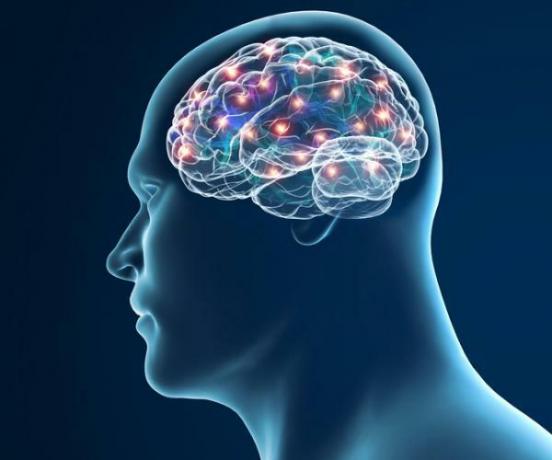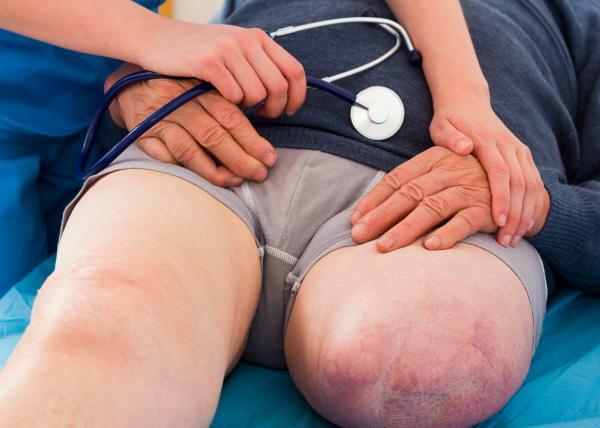
Pain is a perception and, like any perception, it is rooted in sensation and, on a biological level, in the stimulation of receptor neurons. Also, like other forms of perception, pain is sometimes experienced when there is no corresponding biological basis.
At the same time, physical and emotional pain raises many questions in the general population. If you want to know why and how we feel painIn this online Psychology article we will explain it to you.
Index
- What are nociceptors
- The inflammatory soup
- Why do we feel pain
- What is phantom pain
- Natural pain relievers
What are nociceptors.
In the skin and other tissues of the body, there are special sensory neurons called nociceptors. These neurons translate certain stimuli into action potentials that are then transmitted to more central areas of the nervous system, such as the brain. There are four classes of nociceptors:
- Thermal nociceptors they are sensitive to high or low temperatures.
-
Mechanical nociceptorsthey respond to strong pressure on the skin that occurs with cuts and blows. These receptors respond quickly, and often trigger protective reflexes.
- Polymodal nociceptors they can be excited by strong pressure, by heat or cold, and also by chemical stimulation.
- The silent nociceptors they remain quiet (hence their name) but become more sensitive to stimulation when there is inflammation around them.

The inflammatory soup.
When there is significant tissue damage, various chemicals are released into the area around the nociceptors. This produces what is called "inflammatory soup", an acidic mixture that stimulates and sensitizes the nociceptors in a state called hyperalgesia (from the Greek, "great pain").
- Prostaglandins they are released by damaged cells.
- Potassium it is released by damaged cells.
- Serotonin it is released by blood platelets.
- Bradykinin it is released by blood plasma.
- Histamine it is released by mast cells.
In addition to all this, nociceptors release by themselves "substance P", which causes mast cells to release histamine, which in turn stimulates nociceptors.
Itching instead of pain
Histamine is interesting in that, when it stimulates nociceptors, it is experienced as an itch rather than pain. It is not known why. We use antihistamines, of course, "to get rid of the itch."
There are tissues that contain nociceptors that do not carry pain. In the lungs, for example, there are "pain receptors" that cause coughing, but do not make us feel pain.
One of the chemicals associated with pain that actually comes from outside our skin is capsaicin. This is the substance that makes chilli peppers so hot, for example.
Why do we feel pain.
The nerves that carry messages from the nociceptors through the spinal cord follow different tracts. Most go to the thalamus, where they are distributed to various higher centers. Some also go towards the reticular formation (which, among other things, governs alertness) and towards the amygdala (a part of the limbic system involved in emotion).
- Referred pain, like the pain that people sometimes feel in the arms and shoulders when they are having a heart attack, is due to the way the nerves meet in the spinal cord. The brain sometimes loses track of where the pain is coming from.
- The gate theory it is based on the idea of neural signal confusion. It appears that some non-painful stimulation can in some cases interfere with the experience of pain. This is the explanation behind phenomena such as the benefits of rubbing a painful area, the use of hot or cold compresses, acupuncture or acupressure, and electrical stimulation transcutaneous.
- There are people who have had damage to some part of these tracts, often after a blow, and who feel tingling or burning which is aggravated by touching the area. Other people have damage higher up in the brain that causes them to feel pain like any other, but that eliminates the connections to the emotional centers. They feel pain, but they don't.
What is phantom pain.
Phantom pain (the pain that amputees sometimes feel in the same limb they have lost) is due to the fact that when nociceptors are damaged or absent, neurons in the spinal cord that transmit the messages of pain sometimes they become hyperactive. That is why the brain receives pain messages from where no tissue has been left.
In the brain and spinal cord, there are certain chemicals called opiates, or more specifically enkephalin, endorphin and dynorphin. These opiates, as their name suggests, are the body equivalents of opium and its derivatives, morphine and heroin. When released at synapses, transmitted pain levels decrease, just like heroin.

Natural pain relievers.
There really are a variety of things that lessen the experience of pain: marijuana, breast milk (for newborns, of course), pregnancy, exercise, pain and shock, aggression and diabetes. A reduced experience of pain is logically called hypoalgesia.
And there are people who were born with a genetic disability to feel pain at all. It is very rare and a priori it may seem like a blessing. But the percentage of early death is very high in these people, usually because of injuries to which people normals would pay attention (small injuries, such as a sprain) are ignored and develop serious problems later. There have been people with appendicitis who died simply because they didn't realize it.
What is pain for
Of course, this is the reason why pain has evolved as it is: it alerts us to that we sit down, rest, attend to a wound, avoid things that cause pain, among others things. On the other hand, pain is not always helpful. The cancer patient knows her disease and is taking care of it. The often excruciating pain is totally unnecessary, and we must do what we can to get rid of it.

This article is merely informative, in Psychology-Online we do not have the power to make a diagnosis or recommend a treatment. We invite you to go to a psychologist to treat your particular case.
If you want to read more articles similar to Why and how we feel pain, we recommend that you enter our category of Personal growth and self-help.


